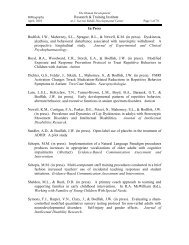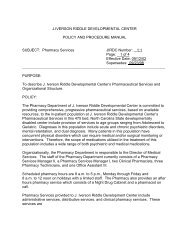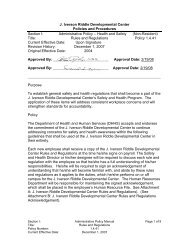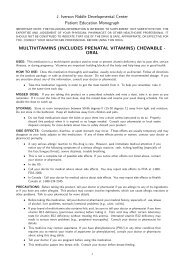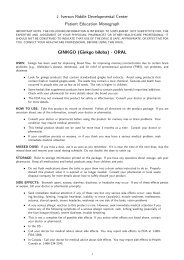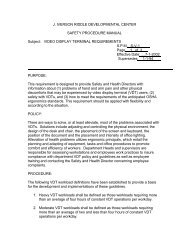J. Iverson Riddle Developmental Center Patient ... - JIRDC Home
J. Iverson Riddle Developmental Center Patient ... - JIRDC Home
J. Iverson Riddle Developmental Center Patient ... - JIRDC Home
You also want an ePaper? Increase the reach of your titles
YUMPU automatically turns print PDFs into web optimized ePapers that Google loves.
J. <strong>Iverson</strong> <strong>Riddle</strong> <strong>Developmental</strong> <strong>Center</strong><br />
<strong>Patient</strong> Education Monograph<br />
IMPORTANT NOTE: THE FOLLOWING INFORMATION IS INTENDED TO SUPPLEMENT, NOT SUBSTITUTE FOR, THE<br />
EXPERTISE AND JUDGEMENT OF YOUR PHYSICIAN, PHARMACIST OR OTHER HEALTHCARE PROFESSIONAL. IT<br />
SHOULD NOT BE CONSTRUED TO INDICATE THAT USE OF THE DRUG IS SAFE, APPROPRIATE, OR EFFECTIVE FOR<br />
YOU. CONSULT YOUR HEALTHCARE PROFESSIONAL BEFORE USING THIS DRUG.<br />
CEFTRIAXONE - INJECTION<br />
USES: Ceftriaxone is an antibiotic used to treat a wide variety of bacterial infections. This medication is known as a<br />
cephalosporin antibiotic. It works by stopping the growth of bacteria.<br />
HOW TO USE: This medication is given by injection into a muscle or vein as directed by your doctor. The dosage<br />
is based on your medical condition and response to therapy.<br />
• If you are giving this medication to yourself at home, learn all preparation and usage instructions from<br />
your health care professional. Before using, check this product visually for particles or discoloration. If<br />
either is present, do not use the liquid. Learn how to store and discard medical supplies safely.<br />
• Antibiotics work best when the amount of medicine in your body is kept at a constant level. Therefore,<br />
use this drug at evenly spaced intervals.<br />
• Continue to use this medication until the full prescribed treatment period is finished, even if symptoms<br />
disappear after a few days. Stopping the medication too early may allow bacteria to continue to grow,<br />
which may result in a return of the infection.<br />
• Tell your doctor if your condition persists or worsens.<br />
MISSED DOSE: For the best possible benefit, it is important to receive each scheduled dose of this medication as<br />
directed. If you miss a dose, contact your doctor or pharmacist immediately to establish a new dosing schedule. Do not<br />
double the dose to catch up.<br />
STORAGE: Consult the package instructions or your pharmacist for other storage details. Keep all medicines away<br />
from children and pets.<br />
• Do not flush medications down the toilet or pour them into a drain unless instructed to do so. Properly<br />
discard this product when it is expired or no longer needed. Consult your pharmacist or local waste<br />
disposal company.<br />
SIDE EFFECTS: Swelling, redness, pain, or soreness at the injection site may occur. This medication may also<br />
infrequently cause loss of appetite, nausea, vomiting, diarrhea, or headache. If any of these effects persist or worsen,<br />
tell your doctor or pharmacist promptly.<br />
• Remember that your doctor has prescribed this medication because he or she has judged that the benefit<br />
to you is greater than the risk of side effects. Many people using this medication do not have serious<br />
side effects.<br />
• Tell your doctor right away if you have any serious side effects, including: dark urine, easy bruising/bleeding,<br />
fast/pounding/irregular heartbeat, seizures, unusual weakness/tiredness, yellowing eyes/skin,<br />
change in the amount of urine, chest pain, trouble breathing, mental/mood changes (such as confusion).<br />
• This medication may rarely cause a severe intestinal condition (Clostridium difficile-associated diarrhea)<br />
due to a type of resistant bacteria. This condition may occur during treatment or weeks to months after<br />
treatment has stopped. Do not use anti-diarrhea products or narcotic pain medications if you have any<br />
of these symptoms because these products may make them worse. Tell your doctor immediately if you<br />
develop: persistent diarrhea, abdominal or stomach pain/cramping, blood/mucus in your stool.<br />
• Use of this medication for prolonged or repeated periods may result in oral thrush or a new vaginal yeast<br />
infection. Contact your doctor if you notice white patches in your mouth, a change in vaginal discharge,<br />
or other new symptoms.<br />
• A very serious allergic reaction to this drug is rare. However, seek immediate medical attention if you<br />
notice any of the following symptoms of a serious allergic reaction: rash, itching/swelling (especially of<br />
the face/tongue/throat), severe dizziness, trouble breathing.<br />
1
• This is not a complete list of possible side effects. If you notice other effects not listed above, contact<br />
your doctor or pharmacist.<br />
• In the US -<br />
• Call your doctor for medical advice about side effects. You may report side effects to FDA at 1-800-<br />
FDA-1088.<br />
• In Canada - Call your doctor for medical advice about side effects. You may report side effects to Health<br />
Canada at 1-866-234-2345.<br />
PRECAUTIONS: Before using ceftriaxone, tell your doctor or pharmacist if you are allergic to it; or to other<br />
cephalosporins; or to penicillins; or if you have any other allergies. This product may contain inactive ingredients,<br />
which can cause allergic reactions or other problems. Talk to your pharmacist for more details.<br />
• Before using this medication, tell your doctor or pharmacist your medical history, especially of: gallbladder<br />
disease, kidney disease, liver disease, stomach/intestinal diseases (e.g., colitis).<br />
• Avoid giving any products by vein that contain calcium (including solutions such as Ringer’s solution,<br />
Hartmann’s solution, parenteral nutrition-TPN/PPN) to a newborn less than 1 month old who is receiving<br />
this medication. Doing so can cause serious problems in the vital organs.<br />
• Ceftriaxone is not recommended for use in newborns with high blood bilirubin levels.<br />
• Tell your doctor if you are pregnant before using this medication.<br />
• This medication passes into breast milk and may have undesirable effects on a nursing infant. Consult<br />
your doctor before breast-feeding.<br />
DRUG INTERACTIONS: Drug interactions may change how your medications work or increase your risk for serious<br />
side effects. This document does not contain all possible drug interactions. Keep a list of all the products you use<br />
(including prescription/nonprescription drugs and herbal products) and share it with your doctor and pharmacist. Do<br />
not start, stop, or change the dosage of any medicines without your doctor’s approval.<br />
• Some products that may interact with this drug include: aminoglycoside antibiotics (e.g., tobramycin,<br />
gentamicin), ”blood thinners” (e.g., warfarin), chloramphenicol, live bacterial vaccines, calcium-containing<br />
IV fluids.<br />
• Although most antibiotics probably do not affect hormonal birth control such as pills, patch, or ring, some<br />
antibiotics may decrease their effectiveness. This could cause pregnancy. Examples include rifamycins<br />
such as rifampin or rifabutin. Be sure to ask your doctor or pharmacist if you should use additional<br />
reliable birth control methods while using this antibiotic.<br />
• This medication may interfere with certain medical/laboratory tests (e.g., urine glucose tests), possibly<br />
causing false test results. Make sure laboratory personnel and all your doctors know you use this drug.<br />
NOTES: Laboratory and/or medical tests (e.g., complete blood count, kidney function tests) may be performed<br />
periodically to monitor your progress or check for side effects. Consult your doctor for more details.<br />
OVERDOSE: If overdose is suspected, contact your local poison control center or emergency room immediately. US<br />
residents can call the US National Poison Hotline at 1-800-222-1222. Canada residents can call a provincial poison<br />
control center. Symptoms of overdose may include: trouble breathing, seizures.<br />
2



